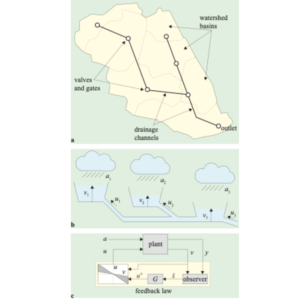Traditional urban infrastructure for mitigation of flooding and stream erosion is comprised of a complex network of pipes, retention basins, and constructed wetlands. Once constructed, these infrastructure assets are rarely changed or monitored, operating effectively in a passive, feed forward fashion for the entire duration of their lifetime (50+ years). In recent years, population increases and land use changes have placed greater burdens on these hydrologic networks, and many municipalities now face the prospect of investing in costly infrastructure expansions to cope with flooding and water quality impairments. In lieu of new construction, some have proposed retrofitting stormwater networks with sensors and controllers to enabled feedback control of entire watersheds. It has been shown that, even if only a fraction of gates or valves are controlled in this fashion, coordinated real-time control has the potential to dramatically reduce the likelihood of flooding during storms.
Retrofitting existing stormwater infrastructure with such technologies requires only a minute fraction of the cost and spatial footprint of an expansion project. The actuators in the control system for an urban water network are restricted to gates and valves, which are incapable of injecting power into the flow. Systematic techniques to optimize closed-loop performance are only practical for very simple systems. Beyond these simple cases, prevailing control design techniques are heuristic, and highly tailored to specific applications. Not only do such techniques fall short of achieving optimal performance, they do not even result in analytically-provable performance bounds. This constitutes a significant knowledge gap.
The objective of this project is to innovate novel feedback controller synthesis tools for complex stormwater systems. The proposed approach makes use of several recent developments in model-predictive control theory, which enable much greater tractability. The goal of the project is to develop a simulation testbed and preliminary results, which can be used as a springboard for a larger follow-on grant from NSF.
People
Funding

Funding: $30K (2022)
Goal: Simulation-based proof-of-concept of nonlinear feedback control systems for city-scale water networks
Token Investors: Jeff Scruggs, Branko Kerkez
Project ID: 1039



